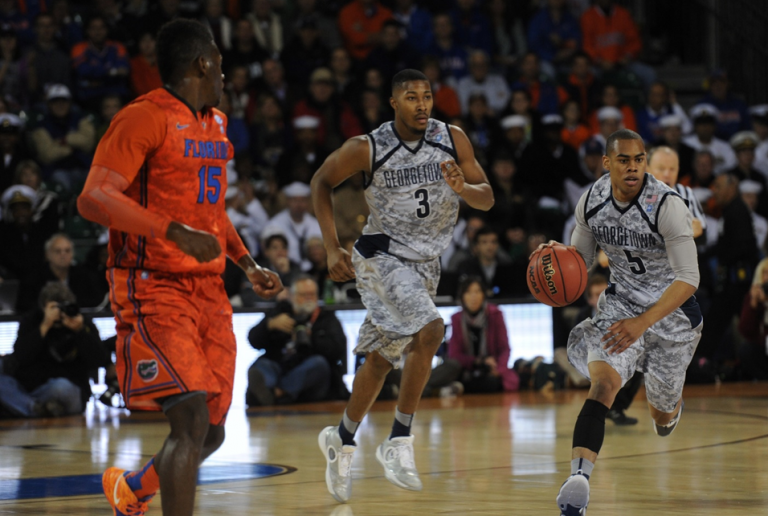Through the years, team apparel has become an essential element in any sporting event. Aside from bolstering team pride and unity, a sharp, uniquely designed uniform helps to form and express an “identity” which fans and sports enthusiasts alike will be proud to rally for. When team apparel excellently displays the team’s name, signature colors and stripes, the brand identity becomes complete and the overall experience is enhanced.
In the Philippines, team apparel has also been playing a more significant role as the local sports scene continues to grow. Nowadays, Filipinos follow a series of exciting professional sports leagues all year round, with basketball being on the top of the list.
New Horizons for a Basketball-obsessed Nation
As a basketball-loving nation, Filipinos consider the sport as a way of socializing or developing the value of sportsmanship among players even from a young age. From school and residential courts to makeshift hoops found in every street corner of every barangay, the Filipinos’ familiarity and undying love for the sport is always noticeable.
Previously, amateur basketball leagues used to peak during summer. Today, they exist throughout the year with even more divisions or categories. Tournaments may be classified as recreational, school-based, semi-professional, or professional, among many others.
According to Benson Dela Paz, a professional league organizer, in Metro Manila alone, there are close to 50 amateur basketball leagues joined by approximately 30 teams per league, and a team will have 12 to 15 members each. The mainstream Metro Manila basketball scene may have 18,000 to 20,000 active players in a year, and the count on a national level is only set to increase, once small to minor leagues within Metro Manila as well as basketball tournaments done in the provinces have already been factored in.
Embracing Innovation
Traditionally, sportswear makers use the manual silkscreen method in printing the designs for dry-performance apparels. However, more and more manufacturers are now using dye sublimation technology, especially local sportswear businesses that offer customization.
Manufacturers now have the power to bring complex designs to life with dye-sublimation technology, a cutting-edge printing method that enables designers to know where every seam, arm, and neck hole will sit, giving them unrivaled creative freedom to put details in the overall design of the uniforms.
With the sustained growth of the local sports scene, sports apparel manufacturers are also gaining new markets due to the increasing demand for personalized sportswear and uniforms. GIG Sportswear, a clothing manufacturer in the Philippines who has been in the business for almost 3 years, now has 70% of its business dedicated to the export of sports apparel to various clients and 30% to the regular supply of uniforms to the National Basketball League (Philippines). They employ Epson’s SureColor SC-F6270 for dye sublimation printing and plan to expand their business further to address the growing demand for customized clothing.
“Our clients always look for quality of print and we have found the results we’ve always wanted with the Epson textile printers,” said Nemar Castillo, owner of GIG Sportswear. “The F-Series’ new HD black ink ensures that our designs are brought to life with pristine colors, and we found that the printers are ideal for our short to medium-volume dye sublimation fabric printing at affordable costs. We also learned that since the increase in demand for customized jerseys, our fellow manufacturers are switching to Epson’s textile printers to serve new clients.”
Traditional Screen vs. Dye Sublimation
Dye sublimation is a digital printing technology which uses full-color artwork that works with polyester and polyester-coated surfaces, a perfect material for dry-performance sportswear apparels. Epson’s SureColor F Series, for instance, is equipped with an advanced sublimation ink technology to enable the design printouts to be imprinted onto the fabric through heat transfer, known as the dye sublimation process.
Unlike silkscreen printing, dye-sublimation printing maintains polyester’s wicking characteristics. This means that the process allows for air and moisture to pass through the garment since the ink or film, commonly used in traditional methods, does not cover the fabric.
When sublimation dye is placed next to polyester during the heat press, the fabric’s molecules open. The dye then turns into a gas and penetrates the fibers of the fabric. After heat is removed, the molecules will close, trapping the brilliant color of the dye and retaining the image permanently in the polyester garment.
Dye-sublimation, as a digital textile printing technology, is also more sustainable and environmentally friendly because of the reduced time in printing personalized garments. The technology also allows for unending creative freedom as it does not limit the patterns and designs that are normally constrained by limitations of conventional textile printing technology.
“Digital textile printing offers endless opportunities, whether in bringing more complex uniform designs to life or in expanding to new markets,” Eduardo Bonoan, Epson Philippines General Manager for Marketing said. “Our SureColor F-Series is ready to support the local sportswear manufacturers in their shift to dye sublimation with high-performance, high-quality output and low power consumption resulting to overall lowered total cost.”


